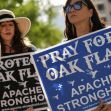Members of the San Carlos Apache tribe filed a federal lawsuit in an Arizona U.S. District Court against the Trump administration early last week. The lawsuit aims to stop a land swap between the U.S. Forest Service and two foreign mining companies, Rio Tinto and BHP. The land swap would hand over valuable tribal land of the Apache known as Oak Flat of Chi'chill Bildagoteel.
The Apache tribe filed the lawsuit one day before the Forest Services was expected to release its Final Environmental Impact Statement (FEIS). After the FEIS is published, there will be a 60-day window for the land exchange to take place.
While the land remained protected under President Eisenhower, there was a land exchange mandate that was attached to a rider the 2015 National Defense Authorization Act. The late Senator John McCain, who also happened to be one of the largest recipients of campaign contributions from Rio Tinto, helped to pass the measure that would eventually allow the mining groups to obtain the land.
Apache Fight Back to Preserve Cultural Identity
The lawsuit accuses the Trump administration of violating the National Historic Preservation Act, the Religious Freedom Restoration Act, and an 1852 treaty between the United States and Western Apache tribes. Apache members shared a statement via email that read in part, “Giving away our sacred land by the U.S. government for destruction by a foreign mining company destroys our ability to practice our religion.”
The land swap would give Rio Tinto the land needed to go forward with their Resolution Copper Project. However, Oak Flat has been viewed as a sacred land for the Apache as well as other Native American groups in the area for centuries. For years, the Apache tribe has used the land for religious ceremonies, sustenance, and habitation. Portions of Oak Flat are also used for recreational activities for the public, and there is even a portion that offers a campground site.
A member of the San Carlos Apache tribe, Wendsler Nosie Sr., shared with the Guardian that the Trump administration rushed to get land ownership of Oak Flat over to the mining companies before he left office. Noise explains, “We were in the fourth quarter with two minutes left in the game. And then Trump cheated so now we only have one minute left. Everybody has to mobilize now to fight this.”
Democratic Arizona representative Raul Grijalva agrees, saying, “The Trump administration is cutting corners and doing a rushed job just to take care of Rio Tinto. And the fact they are doing it during Covid makes it even more disgusting. Trump and Rio Tinto know the tribes’ reaction would be very strong and public under normal circumstances but the tribes are trying to save their people right now.”
Oak Flat is listed on the National Register of Historic Places and is home to numerous wildlife, plant species (many of which tribes used for medicinal purposes), and several archeological indigenous sites that date back nearly 1500 years.
Environmentalists Warn of Disastrous Outcome
Environmental groups, including the Center for Biological Diversity, have highlighted the devastation that Rio Tinto and BHP have been known to cause through their mining endeavors. Most recently, Rio Tinto destroyed aboriginal sites in Australia when it blasted 46,000-year-old rock shelters in Australia's Juukan Gorge. These rock shelters are believed to be some of the oldest forms of human habitation on Earth. Although Rio Tinto promised the aboriginal groups in the area that their cultural site would be protected, the area was left destroyed and led to the resignation of then CEO Jean-Sebastien Jacques.
The current chairman of Rio Tinto has expressed that the company is "determined to ensure that the destruction of a heritage site of such exceptional archaeological and cultural significance never occurs again at a Rio Tinto operation."
There is also worry that because the mining will take place at 7,000 feet underground using technology that has not yet been proven to be the safest or most effective method, the surface of the land will eventually collapse into a crater that could stretch at least a thousand feet deep and a mile wide. Environmentalists worry about the impact to the ground as well as the air as 1.4 billion tons of toxic waste are estimated to be disbursed during the drilling.
The new Administration has not directly addressed the land swap. However, President Biden has express that Native Americans will have "a seat at the table."






